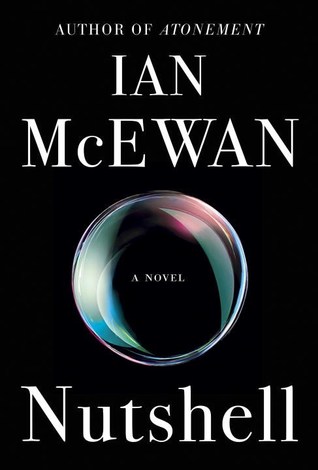Review: Ian McEwan’s “Nutshell”
by Miles Raymer

I’m one of those people who thinks Shakespeare’s Hamlet is the apotheosis of English literature. I’ve never encountered another text that can move me so profoundly, entertain me so thoroughly, or describe the human condition with commensurate depth and clarity. I consider Hamlet to be a once-in-a-civilization––perhaps even a once-in-a-species––creation. So, in one way, I am the perfect reader for Ian McEwan’s Nutshell––a tremendously clever rewrite of this classic tale told from the perspective of a fetus. But, given my immense love for Nutshell’s source material, I also realized I was likely to have mixed feelings about this book; this suspicion turned out to be well-founded.
The first thing I’ll say is that if someone is going to rewrite Hamlet, this is the way to do it. I’ve respected McEwan’s reputation for years, but never actually read any of his books until now. Even in this slim volume, he lives up to the hype. His prose is near-perfect, his mind sharp, and his wit even sharper. Take the book’s opening passage:
So here I am, upside down in a woman. Arms patiently crossed, waiting, waiting and wondering who I’m in, what I’m in for. My eyes close nostalgically when I remember how I once drifted in my translucent body bag, floated dreamily in the bubble of my thoughts through my private ocean in slow-motion somersaults, colliding gently against the transparent bounds of my confinement, the confiding membrane that vibrated with, even as it muffled, the voices of conspirators in a vile enterprise. That was in my careless youth. Now, fully inverted, not an inch of space to myself, knees crammed against belly, my thoughts as well as my head are fully engaged. I’ve no choice, my ear is pressed all day and night against the bloody walls. I listen, make mental notes, and I’m troubled. (1)
Believe it or not, McEwan manages to keep this up for just under 200 pages. There seems to be no limit to his ability to reweave in modern prose the paralytic ruminations that animate Hamlet’s inimitable tone. Like his Danish forefather, our protagonist frets about everything––the precarious state of the modern world, the fate of his wretched family, the human condition, the nature of consciousness, whether his mother will allow herself (and him) a third glass of wine. Most vexing is the feeling of powerlessness generated by the contrast between his keen powers of observation and his physical impotence:
Not everyone knows what it is to have your father’s rival’s penis inches from your nose. By this late stage they should be refraining on my behalf. Courtesy, if not clinical judgement, demands it. I close my eyes, I grit my gums, I brace myself against the uterine walls. This turbulence would shake the wings off a Boeing. My mother goads her lover, whips him on with her fairground shrieks. Wall of Death! On each occasion, on every piston stroke, I dread that he’ll break through and shaft my soft-boned skull and seed my thoughts with his essence, with the teeming cream of his banality. Then, brain-damaged, I’ll think and speak like him. I’ll be the son of Claude. (20-1)
Nutshell is full of incisive and hilarious passages just like this one. Over and over we are treated to the quirky image of a Mensa-level pre-human expounding on subjects that should be closed to him. Many readers will no doubt find these ramblings pretentious, enervating, maudlin. And those are fair criticisms, for the most part; the Hamlet-esque attitude toward existence is not for everyone. But I adore each and every word.
Though McEwan succeeds in bringing fresh linguistic and tonal vigor to his source material, the same cannot be said of his refiguring of Hamlet’s plot. Simply put, Nutshell is much duller. It sports a comparatively abbreviated cast of supporting characters, none of whom is particularly interesting or memorable, and our narrator can’t interact directly with any of them. This predicament serves as an effective metaphor for inaction that’s in keeping with the Bard’s original text, but doesn’t make for a very dynamic or engaging story. In the book’s final pages, McEwan makes a stab at the plaintive mixture of tragedy and hope conjured in the closing scenes of Hamlet, but the translation is warped, somehow stillborn. The book’s central conceit––clever though it may be––cannot escape its inherent gestational limitations.
It can’t be too harsh a criticism to say McEwan failed to reproduce the best thing that’s ever been inked by an English pen. Besides, it’s clear that a mere reproduction wasn’t his goal. This is something new, something fun, and something valuable. Something worth reading.
Rating: 7/10